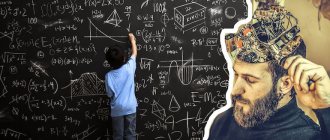To become smarter, you need to develop all types of intelligence at your disposal. But most of us spend our lives exclusively developing our IQ, and this process includes reading, studying, professional growth, and hobbies.
Very few people purposefully develop emotional intelligence, learn to observe people and perceive the emotions of others, and take control of their own emotions. And there are very few who have heard that there are two more types of intelligence, which means additional opportunities to become smarter.
The famous American coach Stephen Covey identifies 4 types of intelligence:
- Physical intelligence (PQ).
- Mental intelligence (IQ).
- Emotional intelligence (EQ).
- Spiritual intelligence (SQ).
Stephen Covey once received an MBA from Harvard and a PhD from Brigham Young Mormon University, and his work in the real economy of Fr. The name of Stephen Covey is included in the list of 25 most influential people in America according to Time magazine. And his book “The 7 Habits of Highly Effective People,” which was translated into many languages around the world, brought him the greatest fame.
In addition to the actual set of skills required to become effective, Stephen Covey points out that each of us has much more opportunities for this than we think. These additional capabilities are precisely the presence of several types of intelligence. Each person develops these types of intelligence to varying degrees, and everyone can further develop any type of intelligence.
To make it clearer what exactly we are talking about, let’s consider in order all the types of intelligence that Stephen Covey identifies.
Physical Intelligence (PQ)
Physical Quotient is a person’s intelligence associated with the physical body, physical attitude, desire for health and beauty, material wealth and comfort. And it is the intelligence of the physical body that activates the human organ systems to ensure survival, healing, development of the physical body necessary to achieve the desired level of well-being and comfort.
A person has the opportunity to develop and apply the physical type of intelligence on an equal basis with any other. A person's tendency to use physical intelligence to solve everyday problems can be determined by his interest in sports, dancing, games, handicrafts - in general, everything that requires physical dexterity. Sometimes physical intelligence is called practical, which fits both into the essence of the definition and into the abbreviation PQ - Practical Quotient.
Physical intelligence is an important basic component of human life, without which its survival and development would be impossible. However, if for some reason only physical intelligence develops, this is not at all enough for the harmonious development of the personality. What distinguishes a person from an animal is mental intelligence, and here, too, some explanations are needed.
Kinesthetic (bodily)
People with this type of thinking perceive the world through their body and can learn with its help. It helps them express their thoughts or attitude towards a subject. Individuals with kinesthetic intelligence move a lot, play sports, dance, and martial arts. They cannot sit still for a long time; they constantly need to do something.
They perfectly feel the space and objects around them, feel time. They stand out for their excellent physical shape and actively use spatial thinking.
Best professions:
- athlete;
- surgeon;
- choreographer;
- dancer;
- conductor;
- military;
- artist.
Such people were especially valued in Ancient Rome and Greece, where a beautiful athletic body was idolized. It was believed that a healthy body is the key to a healthy mind.
Mental intelligence (IQ)
Intelligence Quotient is the very intelligence that a person normally develops throughout his life: studying, improving in his profession, reading books. When we talk about intelligence as such, we mean precisely mental intelligence. So, mental intelligence is our ability to think, analyze, express our thoughts orally and in writing, create abstract images and other mental constructs.
The importance of mental intelligence is so great that people are constantly trying to measure intelligence as a whole and its components in some quantifiable units. A classic example is an IQ test; more recent examples are UPE tests in various subjects, designed to determine the level of knowledge in individual disciplines and, as a result, the level of intellectual development achieved during study at a secondary educational institution.
True, many experts are increasingly inclined to believe that any tests cannot be considered the ultimate truth, and their results cannot be considered an indicator of the level of knowledge, much less intelligence in general. Any tests have their own specific pattern, and often successfully passing a test only indicates that a person has learned to pass tests. Moreover, this applies to both UPE tests and IQ tests.
As an argument against 100% objectivity of tests, the fact is pointed out that creative individuals - artists, writers, musicians - are often strong only in their field, and their analytical abilities and knowledge of the exact sciences can be noticeably lower than the statistical average. But this does not in any way detract from their merits in creativity and does not allow them to consider their intelligence to be underdeveloped.
Nevertheless, everyone needs to work on further development of intelligence. And even representatives of purely creative professions, with a well-developed outlook, have a greater chance of success than their colleagues who have exclusively highly specialized knowledge. However, there are other equally important components of success. And these, as you already understand, are other types of intelligence that we have not yet considered.
Interpersonal (social)
This is a pretty interesting type of thinking. Those with well-developed interpersonal intelligence are able to easily feel other people and have a high degree of empathy. It is typical for them to easily get along with new people, to be able to captivate them literally from the first word. They use different methods of communication: verbal and non-verbal.
They easily sense the mood of the interlocutor, so it is easy and pleasant to communicate with them. They often become leaders in the company, because they can understand those around them, help and always support others.
They like to be around other people, work with them, study, and be in constant contact. They easily understand the mood of the interlocutor, his needs and desires. They can explain the behavior of friends and acquaintances. They have a kind heart and often help others. They know how to control their own emotions.
Suitable professions:
- teacher or educator;
- psychologist;
- artist;
- HR specialist;
- Social worker.
Emotional Intelligence (EQ)
Emotional Quotient is a person’s ability to recognize and correctly interpret the emotions of other people, understand their intentions and motives for actions, as well as understand their own emotions and desires, and be able to manage them. Based on emotional intelligence, competencies such as interpersonal communication skills, teamwork, leadership and many others are developed.
Emotional intelligence has long taken a strong place in the list of so-called soft skills that are subject to mandatory development for everyone who intends to succeed in life. Moreover, the voices of experts from various fields are becoming louder and louder, believing that emotional intelligence should not be underestimated, and that its constituent parameters are more important for success than the IQ level itself, which was customary to focus on previously.
Like other types of intelligence, EQ can and should be developed. At a minimum, you need to learn to take control of your own emotions, try not to allow negative thoughts to take over your consciousness, learn to listen and hear those around you.
By the way, Stephen Covey’s time management matrix helps you put your thoughts and emotions in order: he suggests dividing all your affairs and responsibilities into four categories and planning time for each of them. Then you will have fewer objective reasons for stress and negativity and will have more time for positivity in everyday life. However, maximum calm and awareness are achieved only by those who are able to develop all types of their intelligence, including spiritual.
This is interesting
The theory comes from Howard Gardner, who in 1983 was not afraid to challenge the established school of cognitive science. Unfortunately, despite all its reliability and argumentation, this theory has never gained universal recognition.
Types of intelligence according to this theory:
- Spatial. Excellent spatial orientation, both large and small. This type of intelligence is most developed among drivers of various vehicles, architects, and chess players.
- Bodily-kinesthetic. The ability to use one’s own body, which is expressed in precision of movements, balance, etc. In addition to dancers, this type is well developed among all representatives of applied professions.
- Musical. This type of intelligence is determined by a high sensitivity to sounds in all their manifestations and rhythm. Representatives are singers and players of various instruments.
- Linguistic. Developed perception of everything related to words, their understanding, combination. This type is most dominant among writers and poets.
- Logical-mathematical. The ability to grasp the relationships between symbols and facts. Most developed among scientists.
- Interpersonal. Ability to interact with other people. High ability to understand them, capture mood, attitude, emotions.
- Intrapersonal. The ability to correctly and clearly understand one’s own feelings and emotions, and find solutions to calm down.
- Naturalistic. The ability to understand the differences in nature, find the difference between plants, etc.
The level of development of each type of intelligence and their combination determine a person’s ability to understand a particular object. This theory shows, for example, why brilliant musicians did not master the school curriculum well.
Spiritual Intelligence (SQ)
Spiritual Quotient is the highest of all types of human intelligence. It is spiritual intelligence that makes a person a person capable of setting life goals, searching for and finding his life mission, and comparing his actions with life values. If all higher mammals, along with humans, possess emotional intelligence, then spiritual intelligence is the prerogative of humans exclusively.
Just in development of the topic of spiritual intelligence, Stephen Covey’s next book about the so-called “Eighth Habit” appeared. As you probably guessed from the title, this book became a kind of continuation of the world-famous bestseller “The 7 Habits of Highly Effective People.”
Stephen Covey's eighth skill is the ability to find your voice and inspire others to find their voices. “Finding your voice” according to Covey is the ability to choose your life path, which does not necessarily coincide, but rather does not coincide at all with the average experience of hundreds of thousands of people. This is the ability to make your own choice in any situation. In essence, one’s voice is the “Path to Greatness” when a person lives life with meaning and awareness of its meaning. Of course, such an approach is impossible without spiritual intelligence.
In many ways, another book by Stephen Covey, “Focus on the Main Things,” echoes these ideas. Live, love, learn and leave a legacy.” Spiritual intelligence involves the ability to look back at your life and find the top few things to do first. Stephen Covey, as we see, offers his list of such “main things”:
- Live.
- Be in love.
- Study.
- Leave a legacy.
Your personal list may look a little different, but the point is the same: you should focus on the main things in your life. Also, you should not allow secondary vanity to occupy the main place and main time of your life.
This does not mean at all that a person should not or will not have to engage in routine. You will have to, however, this process can be streamlined by allocating your time to everything. By the way, the previously mentioned time management matrix can also help with this.
So now you have another answer to the question “How to become smarter?” and specific tips in which direction to develop. It is not at all difficult to determine which types of intelligence you currently have to a greater extent, and what should be given more attention. All that’s left to do is start taking action.
And, by the way, our “Cognitive Science” course, aimed at developing thinking, can help you with this. In a couple of months, you will be able to master more than two dozen effective thinking techniques that will allow you to find solutions to the most complex and non-standard problems, achieve great success and make your life better.
We wish you success and look forward to attending our programs!
We also recommend reading:
- Storytelling
- Gardner's Theory of Multiple Intelligences
- What You May Not Know About Intelligence
- Things that help you become smarter
- Valentine's card from 4brain
- Covey's "Eighth Habit": summary
- General Intelligence Factor
- Cattell-Horn-Carroll theory
- Signs of Low Emotional Intelligence
- Deep Learning: What is the essence of the deep learning method?
- Intelligence and its development: several recommendations
Key words: 1Cognitive science, 1Self-knowledge
Express test of human development in 20 areas of life
You will get the most benefit from reading this article if you take a quick assessment of your development.
This way, you can immediately apply your new knowledge to your situation. The test will calculate the following indicators:
- Strategium Personal Score – development in 20 areas.
- Gain factor – the state and dynamics of your situation.
- Development mode is the recommended level of effort when implementing plans.
- Planning horizon – recommended planning period in years.
- Metric of the need for a personal plan.
Leave your email and take the test later!
Previously, all people assessed themselves and others by intelligence quotient (IQ), but science is constantly developing and currently there are several types of intelligence.










